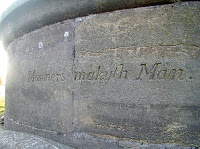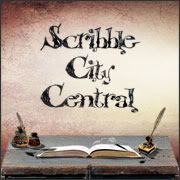
Yes, well all right. I know it's been longer than I said it would but I have WORK to do. You know. Writing. The thing that's supposed to be my job. And this author platform thing is tricky. Takes time and energy (did I already say that?).
So about that technological spider's web you said you were building....
Ah. That. I seem to remember mentioning that I'd talk more about Facebook and Twitter. Only my own personal experience, mind. If you want a step-by-step how-to guide then this is probably not the place for you.
So...FACEBOOK
I joined long ages ago, mostly to keep in touch with far flung friends and family. It's a great timewaster, is Facebook, if you let it be. So I have RULES. They're not set in stone and unbreakable (that would be boring, and I'm an anarchic kind of person who doesn't take kindly to them generally). Perhaps I should call them guidelines.
- When I'm working, I'm working. Writers (and I am happy to be included in this generalisation and to stand by it if challenged), are Adepts of the Art of Procrastination if they let themselves be. However, built into my working day are what I call Facebook breaks. This means a cup of tea, a stretch (very important if you sit at a desk all day as I do), and 15 minutes or so of checking what's going on out there in the world beyond the walls. This is not procrastination, whatever Some People might say.
- There's no doubt that bits of Facebook consist of a morass of utter pap like Farmville (just don't ask, ok) and whatever other timewaster some geek has come up with today. However, there is also some worthwhile stuff to share in--children's literature groups, book groups, interesting pages for almost whatever you can think of to do with reading and writing, links to articles and other blogs etc. And it's a good place to connect with other authors too. Through Facebook, I now have a great support network of other children's authors, who prop me up with lovely sympathy/advice when my status report says something like 'Plot hooks tearing my brain apart in 40 different directions. Need chocolate.'
- It's also a good place to let people know about your blog posts (this one will go up in my status tonight)--and to get your author name and website spread more widely. My Facebook friends are a diverse lot--reviewers, other authors, booksellers, illustrators, librarians, publicists, film scouts etc etc. Facebook helps me get myself out there. Sometimes I'll comment on pages of interest, like Visual Bookshelf or Children's Book Writers and Illustrators. And I've joined things like the Facebook Poets and Writers Registry and Publishing Talk. One tip for commenting is always to leave your blog or website address by your signature. Forinstance, I might sign myself Lucy@http://www.scribblecitycentral.blogspot.com Always use the full http:// version of any link.
- If you are a campaigner, Facebook is an ideal forum for that. I started the Campaign for the Book Official Facebook Page in response to Alan Gibbons' brilliant drive to save our libraries from closure. It now has 772 members. A good many of them now know who I am, and what I write. I've even had school and library visit requests from some of them, which is brilliant. It's an unquantifiable benefit to my author platform, but it is definitely a benefit. I also use an application called Twibbon to (you're going to love this) 'pimp my profile'. All that means is that I can choose a charity or campaign logo (currently Help for Heroes and BBC Bullyproof in my case) and add a tiny version to my profile picture. It's a good way to show support for a favourite cause. (There are also some very silly ones if you are that way inclined. I'm not.)
- Last but not least come PRIVACY SETTINGS. It never ceases to amaze me how many people don't bother with these. It is UNBELIEVABLY IMPORTANT. For a start, don't put the year of your birth up. That's a no-no. And do bother to go and set all your options on the privacy buttons in your settings to 'only friends'. That way you are much less likely to be spammed or phished or have any other internet horror plaguing you. I have a rule (and this IS a rule not a guideline) about friend requests too. If someone I don't know from Adam, and with whom I have no friends in common, sends me a request, I will send them a message politely enquiring how I know them. At least I will if they don't have a name like 'Pornobits O' Stripper', which is a good hint to hit the 'Ignore' button. Very often I get no reply. If I do, and they are in the industry, then fine, I'll probably say yes. Otherwise I will gently direct them to my fan page. If I do befriend someone (known in FB world as 'friending') and they cross my line in the sand, then I will 'defriend' (yep, another new word!) and block them so they can't even see me. Life is too short to mess about with idiots, and I have made a few mistakes in the early days. In other words, mess with me on Facebook, and I will BITE. *polishes gleaming set of fangs*
I like Facebook. Many people don't understand this, and don't get it. That's fine by me. But I am a nosy and curious person. I like having mad discussions about hairy/non-hairy werewolf chests or philosophical discussions about the existence of crocodiles (just a sample from today). I like knowing what other authors are doing and writing (or not writing). I like chatting about books and sharing interesting articles. I sit in my little room all day, alone and writing, which is my happily-made choice. But Facebook gives me a line out to the outside world, and that's essential for my sanity.
Er...and Twitter? What about Twitter?
Look, I've gone on long enough. Blog break is over. There's a novel needing some more tweaking before I have to cook supper and let the puppies out for a wee (good, patient writer's dogs that they are). My Twitter wisdom will have to be a treat for next time. And I haven't even mentioned Googlewave yet....
Part 3 will appear for your delectation very shortly. Well, fairly shortly. Ish.




































